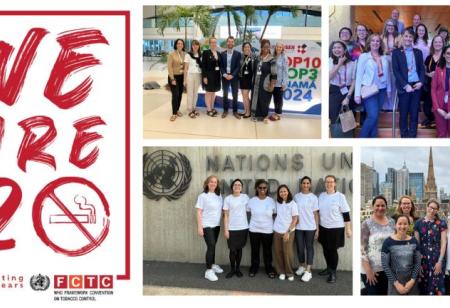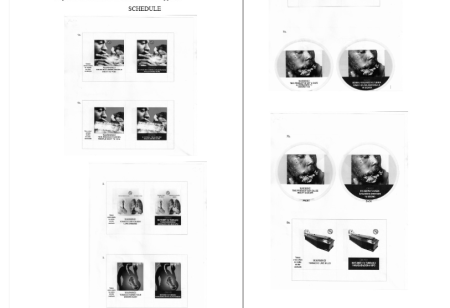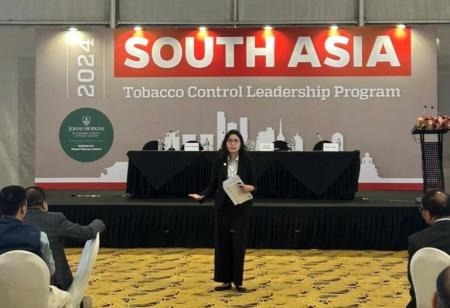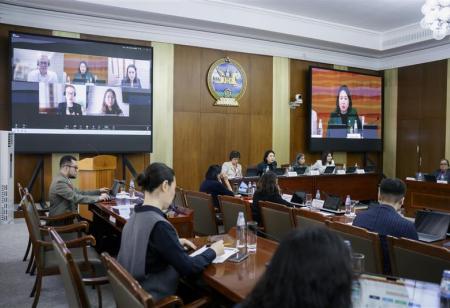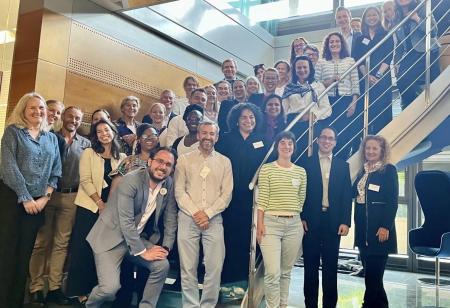
Alumni workshop builds on global efforts to address cancer and other NCDs - 6 July 2021
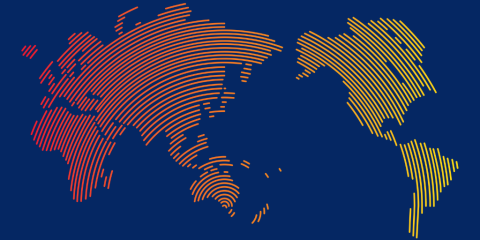
Alumni of the McCabe Centre for Law & Cancer’s international legal training program recently took part in a dedicated workshop to build on their efforts using law to prevent and control cancer and other noncommunicable diseases (NCDs).
A total of 24 lawyers and policymakers attended the five-day virtual workshop, which involved a series of alumni-led presentations, interactive group discussions and expert panels. Alumni dialled in from 19 different countries across Asia, Africa, the Pacific and Latin America.
The event kicked off on Monday 21 June 2021 with Acting Director of the McCabe Centre, Hayley Jones, welcoming alumni and congratulating them on the far-reaching impact of their work.
“Many of you have been working tirelessly behind the scenes for many years to progress laws and policies,” said Hayley. “While we haven’t been beside you physically in [your] countries’ courtrooms or legislatures, we are proud to stand with you when you need technical support or guidance.”
The workshop continued with a series of presentations from alumni, who shared insights from their work using law to address cancer and NCDs in their respective countries. With training and technical support from the McCabe Centre, alumni have helped pass public health laws in at least 19 countries and defend laws in another six countries.
Alumnus Davi Bressler, a prosecutor in Brazil’s Attorney General’s office, shared details about his country’s landmark lawsuit against the tobacco industry to recover the cost of treating tobacco-related illnesses in its public health system.
“Tobacco-related diseases impose a massive cost to [Brazil’s] healthcare system,” Davi said. “The population is being held up with the burden.”
The massive, ongoing case was filed in 2019 and was several years in the making. Davi said it largely started taking shape during his time at the McCabe Centre international legal training course in 2016.
“The ripple effect [the McCabe Centre] has over the world can travel far,” he added.
The workshop also featured an impressive line-up of guest speakers, including an address from Cary Adams, CEO of the Union for International Cancer Control (UICC) – a founding partner of the McCabe Centre. Cary spoke about how cancer control initiatives require strong partnerships, inspiring leaders and a sound funding model.
“I think [what] is important for any organisation when it’s deciding what sort of impact it wants to have, is getting the right people in the right structure around the table,” said Cary. “You need a very clear and simple ambition which cannot be misunderstood.”
CEO of Cancer Council Victoria, Todd Harper, reflected on the global knock-on effect caused by the successes of Australia’s world-first plain packaging laws. He noted the importance of forming critical relationships between those involved in law, advocacy, communications and research, to design and defend reforms in the tobacco industry.
“We all must have the courage and the foresight to be identifying new opportunities to enhance public health,” said Todd. “We have an obligation to develop the evidence, understand the implications and evaluate policy measures so that we can share that work globally.”
The McCabe Centre has since worked with 15 of the 17 countries that adopted tobacco plain packaging laws, which has resulted in the protection of more than 400 million people from the marketing tactics of the tobacco industry.
The ripple effect [the McCabe Centre] has over the world can travel far.
Additional presentations were delivered by the Australian Department of Health, the Secretariat for Pacific Communities, NCD Alliance, the WHO Framework Convention on Tobacco Control Secretariat, representatives from the WHO Regional Office for the Western Pacific and Regional Office for Africa as well as the McCabe Centre team.
For 2018 alumna Suzan Apita Akello, the virtual workshop provided access to information and resources to inform her work as a State Attorney in Uganda, despite the pandemic.
“COVID has taught us a new way to carry out the training […] even if we cannot meet physically.” she said. “The information shared has been so useful, we cannot get such information anywhere else. I am personally privileged to be part of the McCabe [Centre] network.”
The McCabe Centre’s alumni network includes more than 200 lawyers and policymakers from 70 countries who have taken part in in-person training courses since 2014. In 2020, the McCabe Centre launched an online version of its legal training course and has since welcomed a further 75 alumni to its network. The International Legal Training Program is supported primarily by the Australian Department of Foreign Affairs and Trade. Funding is also received from other government agencies and intergovernmental organisations.

